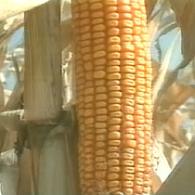-
(单词翻译:双击或拖选)
Miami
06 April 2007
The leaders of Cuba and Venezuela, are criticizing President Bush's recent call to increase biofuel production, because of what they say is the potential impact on food supplies beyond U.S. borders. VOA's Brian Wagner in Miami looks at how the drive for biofuels is changing agriculture in several countries that have embraced the trend, sometimes for the better, sometimes not.
 |
| U.S. ethanol is made from corn |
Venezuela's president, Hugo Chavez, also has criticized U.S. plans to increase ethanol production, saying it will take away food from the poor to, in his words, fuel "rich people's cars."
U.S. officials have not responded to the claims from Mr. Chavez or Mr. Castro, who are frequent critics of U.S. policy.
But Jorge Pinon, the former president of Amoco Oil's Latin American operations, says the attacks are entirely5 political.
"I think people are just making more of this issue than there really is," he explained. "It's politically motivated, because in no way is it going to take food out of the mouths of the world's poor."
Instead, Pinon says sugar-producing countries like Cuba should embrace the trend, and begin producing more sugar for the regional ethanol market. In Brazil, ethanol made from sugar cane6 is now widely available for automobiles7, while corn is the basis of the U.S. program.
Around the region, farmers are hoping to take advantage of the increasing demand for crops used to make ethanol, and they are starting to see higher prices for their goods, says Sarah Ladislaw, a fellow in the energy program at the Center for Strategic and International Studies in Washington.
"Is ethanol demand in the United States right now putting an upward pressure on corn prices? I think it is," he said. "But what you're seeing in turn, is that corn farmers are planning on producing a lot more corn in the next few years to keep up with that demand."
This year, U.S. farmers are expected to increase land used to raise corn by 15 percent, says Ford8 Runge, director of the Center for International Food and Agricultural Policy at the University of Minnesota. The result is that vegetable sellers are beginning to have trouble finding farmers to grow sweet corn, beans and other foods.
"They can't get anybody to grow those things this year, because everyone wants to grow corn for ethanol," he noted9. "So, that's going to drive the prices of those products up, as well."
Runge says the rising prices of corn and other foods will hurt American consumers, but the impact on global prices will be even more serious for people in poor nations. Already, higher prices of corn for the corn-based staple3, tortillas, have sparked protests in Mexico.
U.S. officials say crop-based ethanol is only one part of the current plan to expand alternative energy sources aimed at lowering the nation's dependence10 on imported oil. President Bush has also called for more research into producing cellulosic ethanol from switchgrass and other products that are not part of the food supply.
Ford Runge says the technology behind cellulosic ethanol is still a few years away.
"Although cellulosic alternatives are important, and potentially feasible in the next five, or more likely 10 years, they really don't respond to the immediate11 crisis being created by the corn and soybean-based craze," he explained.
Runge and other experts say one important way to reduce pressure on crop prices is to cut government subsidies12 to millions of U.S. farmers. The Bush administration is backing a current bill in Congress that would end payments to some farmers. But lawmakers are expected to resist any efforts to make broad cuts to farm subsidy13 programs. The issue has been a major sticking point in World Trade Organization negotiations14.
 收听单词发音
收听单词发音
1
ailing

|
|
| v.生病 | |
参考例句: |
|
|
|
2
lashed

|
|
| adj.具睫毛的v.鞭打( lash的过去式和过去分词 );煽动;紧系;怒斥 | |
参考例句: |
|
|
|
3
staple

|
|
| n.主要产物,常用品,主要要素,原料,订书钉,钩环;adj.主要的,重要的;vt.分类 | |
参考例句: |
|
|
|
4
staples

|
|
| n.(某国的)主要产品( staple的名词复数 );钉书钉;U 形钉;主要部份v.用钉书钉钉住( staple的第三人称单数 ) | |
参考例句: |
|
|
|
5
entirely

|
|
| ad.全部地,完整地;完全地,彻底地 | |
参考例句: |
|
|
|
6
cane

|
|
| n.手杖,细长的茎,藤条;v.以杖击,以藤编制的 | |
参考例句: |
|
|
|
7
automobiles

|
|
| n.汽车( automobile的名词复数 ) | |
参考例句: |
|
|
|
8
Ford

|
|
| n.浅滩,水浅可涉处;v.涉水,涉过 | |
参考例句: |
|
|
|
9
noted

|
|
| adj.著名的,知名的 | |
参考例句: |
|
|
|
10
dependence

|
|
| n.依靠,依赖;信任,信赖;隶属 | |
参考例句: |
|
|
|
11
immediate

|
|
| adj.立即的;直接的,最接近的;紧靠的 | |
参考例句: |
|
|
|
12
subsidies

|
|
| n.补贴,津贴,补助金( subsidy的名词复数 ) | |
参考例句: |
|
|
|
13
subsidy

|
|
| n.补助金,津贴 | |
参考例句: |
|
|
|
14
negotiations

|
|
| 协商( negotiation的名词复数 ); 谈判; 完成(难事); 通过 | |
参考例句: |
|
|
|















